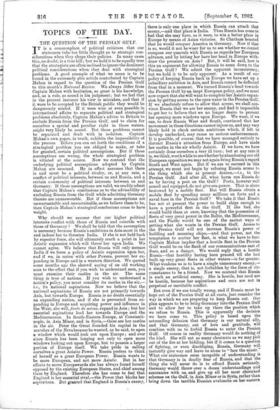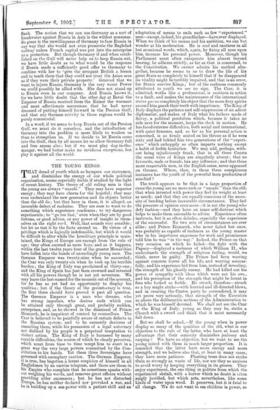TOPICS OF THE DAY.
THE QUESTION OF THE PERSIAN GULF.
IT is a commonplace of political criticism that our statesmen take too little thought as to strategic con- siderations when they shape their policies. In many cases this, no doubt, is a true bill ; but we hold it to be equally true that the strategists are often inclined to ignore the dominant political considerations when they deal with strategical problems. A good example of what we mean is to be found in the extremely able article contributed by Captain Mahan in regard to the question of the Persian Gulf to this month's National Review. We always differ from Captain Mahan with hesitation, so great is his knowledge, and, as a rule, so sound is his judgment; but we feel that in the present instance his view is mistaken, and that if it were to be accepted by the British public they would be dangerously misled. If it were wise or even possible in international affairs to separate political and strategical problems absolutely, Captain Mahan's advice to Britain to exclude Russia from the Persian Gulf, and to claim for ourselves a special and peculiar right in those waters, might very likely be sound. But those problems cannot be separated and dealt with in isolation. Captain Mahan's own paper, in truth, exhibits the impossibility of the process. Before you can set forth the conditions of a strategical problem you are obliged to make, or take for granted, certain political assumptions. But if those assumptions are wrong, the whole strategical problem is vitiated at the source. Now we contend that the underlying political assumptions adopted by Captain Mahan are unsound. He in effect assumes that there is and must be a political rivalry, or, at any rate, a conflict of political interests, between us and Russia, and a certain community of political interests between us and Germany. If those assumptions are valid, we readily admit that Captain Mahan's conclusions as to the advisability of excluding Russia from the Gulf while admitting Germany thereto are unanswerable. But if those assumptions are unwarrantable and unsustainable, as we believe them to be, then Captain Mahan's strategical conclusions cease to have weight.
Why should we assume that our higher political interests conflict with those of Russia and coincide with those of Germany ? We shall be told that the assumption is necessary because Russia's ambitions in Asia must in the end induce her to threaten India. If she is not held back by superior force, she will ultimately reach a point in her Asiatic expansion which will throw her upon India. We cannot agree. We believe that Russia will only menace India if we force a policy of Asiatic expansion upon her, and if we, in union with other Powers, prevent her ex- panding in Europe and in a western direction. We quoted some months ago the shrewd saying of an old working man to the effect that if you wish to understand men, you must examine their castles in the air. The same thing is true of nations. If you wish to understand a nation's policy, you must consider its castles in the air,- i.e., its national aspirations. Now we believe that the national aspirations of Russia are not primarily towards Asia, but towards Europe. Russia is no doubt essentially an expanding nation, and if she is prevented from ex- panding in Europe and acquiring power and influence in the West, she will, faute de mieux, expand in Asia ; but her essential aspirations lead her towards Europe and the Mediterranean. In South-Eastern Europe, at Constanti- nople, in Asia Minor, and in Syria,—there are her castles in the air. Peter the Great founded his capital in the marshes of the Nevabecause he wanted, as he said, to open a window which would look out upon Europe ; and ever since Russia has been longing not only to open more windows looking out upon Europe, but to possess a larger portion of Europe itself. We take pnde in calling ourselves a great Asiatic Power. Russia prefers to think of herself as a great European Power. Russia wants to be more European, and not more Asiatic. But in her efforts to move Europewards she has always found herself opposed by the existing European States, and chief among them by England. Therefore she has come to feel that England is her essential rival,—the Power that blocks her aspirations. But granted that England is Russia's enemy, there is only one place in which. Russia can attack that enemy,—and that place is India. Thus Russia, has come to feel that she may have, as it were, to win a better place in Europe by means of Asian victories. So Chatham boasted that he would conquer America in Germany. Now if that is so, would it not be wiser for us to see whether we cannot compose our quarrels with Russia as regards her European advance, and by letting her have her head in Europe with- draw the pressure on Asia? But, it will be said, how is this an argument for allowing Russia to come down to the Persian Gulf ? We admit the apparent inconsistency, but we hold it to be only apparent. As a result of our policy of keeping Russia back in Europe we have set up a subsidiary ambition in Asia, and Russia cannot be deflected from that in a moment. We turned Russia's head towarde the Persian Gulf by an inept European policy, and we must now expect that she will want to complete her Asiatic expan- sion by getting access to the open water in the Persian Gulf. If we absolutely refuse to allow that access, we shall con- vince Russia that we are her enemy, and find it impossible to get her to believe that we no longer desire to prevent her opening more windows upon Europe. We want, if we can, to draw Russia West and South, convinced that her movement in those directions cannot injure us, and may very likely hold in check certain ambitions which, if left to develop unchecked, may cause us serious embarrassment. It is possible, of course, that we have managed entirely to distract Russia's attention from Europe, and have made her castles in the air wholly Asiatic. If we have; we have certainly done ourselves a very ill turn ; but at any rate it is, we think, worthwhile to seewhether byabandoning our old European opposition we may not again bring Russia's regard South and West again. But if we are to succeed in this attempt, we must not begin by refusing Russia access to the thing which she at present desires,—i.e., to the Persian Gulf. And after all, what harm can Russia do us by having a port on the Gulf ? Ports, however well armed and equipped, do not give sea-power. That is alone bestowed by a mobile fleet. But will Russia obtain a mobile fleet by spending many millions on forts and a naval base in the Persian Gulf ? We take it that Russia has not at present the power to build ships enough to have a powerful fleet in the Gulf. If she had, she would build them at once, knowing that the possession of fleets of very great power in the Baltic, the Mediterranean, and the Pacific would be one of the easiest ways of getting what she wants in the Persian Gulf. Access to the Persian Gulf will not increase Russia's power of building and manning ships,—and that power, not the temptation to scatter her fleet, is what we have to fear. Captain Mahan implies that a hostile fleet in the Persian Gulf would be on the flank of our communications east of Suez, and so a danger. We would reply that a hostile Russia—that hostility having been pressed till she had built up very great fleets in other waters—is far greater. What weakens us is to have a single unnecessary enemy,— a single enemy, that is, not forbidden by the force of cir- cumstances to be a friend. Now we contend that Russia is such an artificial enemy. She is hostile, but need not be hostile, because her aspirations and ours are not in perpetual or inevitable conflict.
But even if we are totally wrong, and if Russia must be kept out of the Persian Gulf at all costs, just consider the way in which we are preparing to keep Russia out. Our plan appears to be to bring Germany into the Persian Gulf and to allow her to take up there the position which we refuse to Russia. This is apparently the decision we have come to. This policy is based upon the astounding delusion that Germany is our natural ally. and that Germany, out of love and gratitude, will combine with us to forbid Russia to enter the Persian Gulf. Of course in reality Germany would do nothing of the kind. She will eat as many chestnuts as we may pick out of the fire at her bidding, but if it comes to a question of fighting, or even disobliging, Russia, Germany will instantly give way and leave us alone to "face the music." What our statesmen seem incapable of understanding is that Germany is in deadly fear of Russia, and that the thing she will never do is to offend Russia seriously. Germany would throw over a dozen' understandings and assurances with us, and give up all her most cherished schemes on the Gulf, in Asia Minor or in Syria, rather than bring down the terrible Russian avalanche on her eastern flank. The notion that we can use Germany as a sort of breakwater against Russia in Asia is the wildest nonsense. So great is the unwillingness of Germany to face Russia in any way that she would not even prosecute the Baghdad railway unless French capital was put into the enterprise as a protection. But though Germany if and when estab- lished on the Gulf will never help us to keep Russia out, we have little doubt as to what would be the response if Russia made a sufficiently good offer to Germany to combine with her to give the arrogant British a lesson and to teach them that they could not treat the Asian seas as if they were their private property.' Granted that we want to injure Russia, Germany is the very worst Power we could possibly be allied with. She dare not stand up to Russia even in our company. And Russia knows it, for we have little doubt that the other day at Royal the Emperor of Russia received from the Kaiser the warmest and most affectionate assurances that he had never dreamed of putting himself forward in the Persian Gulf, and that any German activity in those regions would be purely commercial.
In a word, if we mean to keep Russia out of the Persian Gulf, we must do it ourselves, and the introduction of Germany into the problem is more likely to weaken us than to strengthen us. If we decide to let Russia come into the Gulf, then by all means let us allow Germany full and free access also ; but if we must play dog-in-the- manger, we bad better make no invidious exceptions, but play it against all the world.







































 Previous page
Previous page